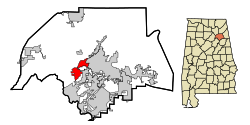Attalla, Alabama
| Attalla, Alabama | |
|---|---|
| City | |

Downtown Attalla
|
|
| Motto: "Gateway to Northeast Alabama" | |
 Location in Etowah County and the state of Alabama |
|
| Coordinates: 34°0′35″N 86°5′54″W / 34.00972°N 86.09833°W | |
| Country | United States |
| State | Alabama |
| County | Etowah |
| Area | |
| • Total | 7.0 sq mi (18.1 km2) |
| • Land | 7.0 sq mi (18.1 km2) |
| • Water | 0 sq mi (0 km2) |
| Elevation | 545 ft (166 m) |
| Population (2010) | |
| • Total | 6,048 |
| • Density | 866/sq mi (334.5/km2) |
| Time zone | Central (CST) (UTC-6) |
| • Summer (DST) | CDT (UTC-5) |
| ZIP code | 35954 |
| Area code(s) | 256 |
| FIPS code | 01-03028 |
| GNIS feature ID | 0157880 |
| Website | www |
Attalla is a city in Etowah County, Alabama, United States. As of the 2010 census, the population was 6,048.
The town occupies the site of an Indian village which was of considerable importance during the Creek War. It was in Attalla that David Brown, a Cherokee assisted by the Rev. D. S. Butterick, prepared the Cherokee Spelling Book.
Attalla was not founded until 1870, on land donated by W. C. Hammond, a plantation owner. It was incorporated as a city government on February 5, 1872. The town was officially named "Attalla" in 1893, from the Cherokee language word meaning "mountain". Attalla was prosperous until the railroads that it depended on went into bankruptcy.
Attalla is the site of the first hydroelectric dam to provide electricity for a city, constructed in 1887.
William Lewis Moore, a U.S. postman and white civil rights activist, was murdered here on April 23, 1963 as he tried to walk from Chattanooga, Tennessee to Jackson, Mississippi to deliver his letter in support of civil rights to Mississippi Governor Ross Barnett. The suspected murderer, Floyd Simpson, was never charged with the crime.]].
Attalla is in Etowah County at 34°0′35″N 86°5′54″W / 34.00972°N 86.09833°W (34.009818, -86.098413). It is bordered to the east by the city of Gadsden, the county seat, and at its southernmost point by Rainbow City.
...
Wikipedia
